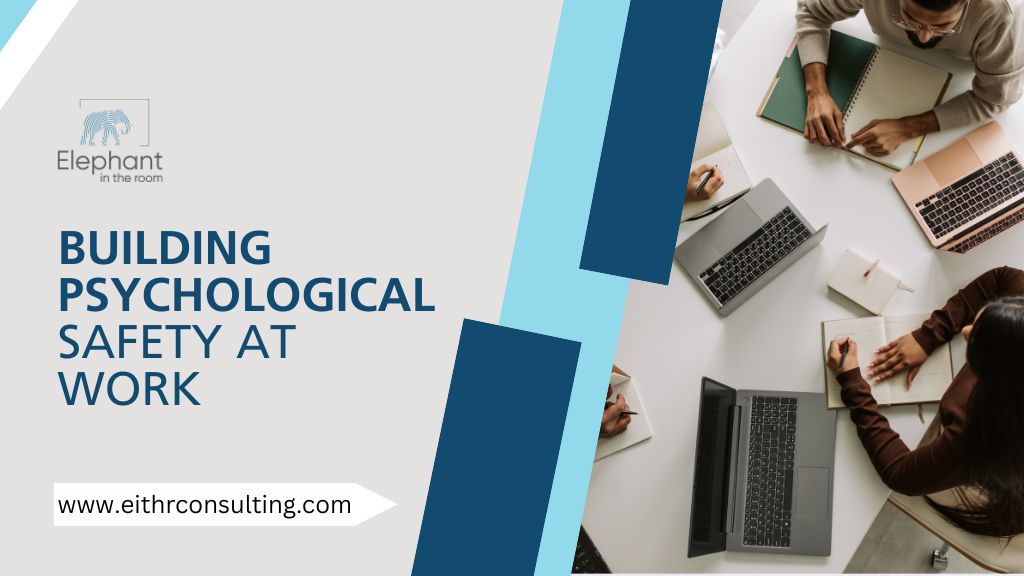According to Google’s Project Aristotle, teams with high employee psychological safety are 19% more productive than those without it, proving that this is not just a “nice-to-have” but a performance driver.
Psychological safety is the belief that you can speak up, ask questions, and share concerns without fear of judgment or negative consequences. It creates an environment where team members feel respected, supported, and comfortable being themselves.
What Makes Psychological Safety a Performance Driver?
In the first few months of a new job, young employees are trying to prove themselves, learn the work, and scan the room for safety: “Is it safe to be me here?”
When they feel overlooked, undermined, judged, or scrutinised, they disengage, hesitate to ask growth-propelling questions, and operate from fear instead of confidence, resulting in an unmotivated, disconnected, low-initiative workforce.
That’s why psychological safety matters most. A safe start for employees isn’t optional; it’s strategic.
KEY TAKEAWAYS
- Why it matters: Psychological safety drives confidence, learning, and innovation. Teams with it are 19% more productive.
- Who’s most at risk: New and young employees often fear judgment, mistakes, or asking questions without support.
- How leaders can help: Encourage curiosity, give clear feedback, recognise effort, and lead with empathy.
Why New and Young Employees Are at a Higher Risk
Fresh out of college or transitioning into a new role, early-career professionals often face invisible stressors:
- Fear of appearing incompetent
- Pressure to prove their worth quickly
- Confusion about team dynamics and expectations
- Lack of clarity around acceptable boundaries
Without psychological safety for employees, these stressors amplify. What should be a period of growth becomes one of guarded self-preservation.
But when a manager creates space for questions, feedback, and failure, everything shifts. New employees begin to contribute authentically, learn faster, and integrate more meaningfully into the team.
👉 OUR TAKE: When leaders create space for curiosity, clarity, and empathy, young employees don’t just adapt, they accelerate. Psychological safety isn’t a perk; it’s the foundation of growth, innovation, and long-term retention.
5 Ways Managers Can Foster Psychological Safety
- Welcome Questions and Curiosity
Reinforce that asking questions is a strength, not a weakness. Start meetings by inviting doubts or clarifications. A manager who models curiosity creates a culture where learning is valued. - Offer Clarity Then Repeat It
Young employees often hesitate to ask for clarification. Don’t wait for them to speak up; proactively set expectations and check for understanding. Clear is kind, especially in the early days. - Recognise Effort, Not Just Outcomes
When only results are rewarded, employees become risk-averse. Instead, celebrate initiative, thought process, and learning moments, especially when someone’s new to the role. - Practice Feedback with Empathy
The delivery of feedback matters as much as the content. Use language that encourages growth, not defensiveness. Feedback should feel like a hand extended, not a finger pointed. - Invest in Mental Health Training for Managers
Improving psychological safety for employees isn’t just a gut feeling; it’s a leadership skill. Through targeted mental health training for managers, leaders learn how to spot stress signals, lead difficult conversations, and support emotional wellbeing alongside performance.
» For deeper insights into supporting younger employees, explore our Why Gen Z is Stressed at Work and What Companies Can Do.
What Happens When You Don’t Prioritise Safety?
Silence.
That’s what usually follows when employees don’t feel safe. Silence in meetings, Silence when things go wrong, Silence in exit interviews.
Without employee psychological safety, companies lose more than engagement. They lose innovation, trust, and rising talent who never get the chance to shine.
On the other hand, when managers lead with empathy and clarity, young employees step up. They take initiative, they share ideas, they grow and help the business grow, too.
Psychological Safety Training for Your Team
Create a workplace where new and young employees feel safe to learn, ask questions, and grow with confidence. Our expert-led Psychological Safety Training equips managers with tools to build trust, encourage open dialogue, and strengthen team collaboration.
Reach us at +91-9004830116 to book a free consultation. (9am to 6pm IST, Mon–Fri)
What Leaders Should Do to Build Psychological Safety
- Encourage questions openly
Create a space where employees feel safe to ask and share without hesitation. - Give clear, supportive feedback
Use feedback to guide, not intimidate, building trust and confidence. - Set a positive, respectful tone
Model calm, respectful communication in every interaction. - Lead with empathy and emotional awareness
Show understanding and support, especially for young or new employees. - Provide clarity and direction
Clear expectations and guidance help employees feel secure and willing to speak up.
At Elephant in the Room Consulting, we help organisations build psychologically safe workplaces where young employees can truly grow. Just as routine inspections keep a property safe, our structured programs equip managers with empathy, clarity, and emotional intelligence to prevent issues before they arise, turning entry-level roles into long, fulfilling careers.
Frequently Asked Questions
What are the 4 types of psychological safety?
- Inclusion Safety
- Learner Safety
- Contributor Safety
- Challenger Safety
What are the 5 C’s of psychological safety?
Clarity, Candour, Curiosity, Compassion, and Courage.
What is psychological safety for employees?
It’s the belief that employees can speak up, ask questions, and take risks without fear of embarrassment or punishment.
How to improve psychological safety for employees?
Managers can build safety by welcoming questions, offering clarity, recognizing effort, giving empathetic feedback, and investing in mental health training.





